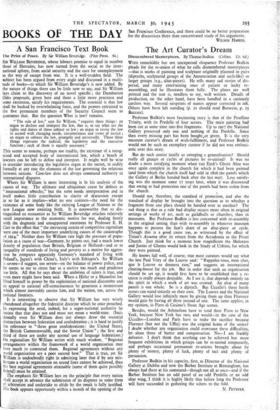BOOKS OF THE DAY
A San Francisco Text Book
The Price of Peace. By Sir William Beveridge. (Pilot Press. 6s.)
SIR WILLIAM BEVERIDGE, WhOSC labours promise to equal in number those of Hercules, has now turned from the social to the inter- national sphere, from social security and the cure for unemployment to the way of escape from war. It is a well-trodden field: The subject has been argued from every angle and discussed in a multi- tude of books—to which Sir William Beveridge's is now added. By the nature of things there can be little new to say, and Sir William lays claim to the discovery of no novel specific ; the Dumbarton Oaks proposals, given here and there a little more precision and some extension, satisfy his requirements. The essential is that law shall be backed by overwhelming force, and the powers entrusted to the five permanent members of the Security Council seem to guarantee that. But the question What is law? remains.
"The rule of law," says Sir William, "requires three things: an _organ to declare and interpret the law, that is, to say what are the rights and duties of those subject to law ; an organ to revise the law in accord with changing needs, circumstances and views of justice ; an organ to enforce the law, promptly and universally. These three things represent the judicial, the legislative and the executive function ; each of them is equally necessary."
This seems to assume, perhaps too readily, the existence of a recog- nised and accepted body of international law, which a bench of lawyers can be left to define and interpret. It might well be wise to consider introducing the legislative organ at the outset, to codify formally at any rate the elements of the law governing the relations between nations. Case-law does not always command authority in international disputes.
Where Sir William is most interesting is in his analysis of the causes of war. The ultimate and ubiquitous cause he defines as "international arParchy,"'but the term needs interpretation and in itself makes little contribution to clarity - of discussion except in so far as it implies—what no one contests—the need for the existence of some body like the existing League of Nations or the new League now awaiting birth. It is noteworthy that so dis- tinguished an economist as Sir William Beveridge attaches relatively small importance to the economic motive for war,_ dealing firmly with the dogmatic and unsupported statement by Professor E. H. Carr to the effect that "the increasing strains of competitive capitalism were one of the most important underlying causes of the catastrophe of 1914." Neither does Sir William rate high the pressure of popu- lation as a cause of war—Germany, he points out, had a much lower density of population than Britain, Belgium or Holland—and as to inequality of standards of living and poverty as a motive for aggres- sion he .compares appositely Germany's standard of living with Poland's, Japan's with China's, Italy's with Ethiopia's. Sir William is severe—I suggest, too severe—on the balance of power policy, and he seems to me to stress fear as a motive too much and prudence too little. All that he says about the ambition of rulers is true, and even more might have been said. When a Hitler or a Mussolini has lifted himself to power by the exploitation of national discontent and an appeal to national self-consciousness he generates a momentum which almbst inevitably carries him, and the nation, too, across the national frontiers.
It is interesting to observe that Sir William has very wisely abandoned altogether the federalist doctrine which he once preached. In expressing the need, indeed, for a super-national authority he insists that that does not and must not mean a world-state. (Inci- dentally even Sir William does not always draw the essential distinction between federation and confederation ; it is hard to justify the reference to "three great confederations: the United States, the British Commonwealth, and the Soviet Union" ; the first and third of these are under any normal use of language federations.) On regionalism Sir William writes with much wisdom. "Regional arrangements within the framework of a world organisation may have much to commend them. Regional agreements without any world organisation are a poor second best." That is true, yet Sir William is undoubtedly right in admitting later that if by any mis- fortune a world organisation on sound lines cannot be achieved, then the best regional agreements attainable (some of them quite possibly federal) must be attained.
The emphasis Sir William lays on the principle that every nation shall accept in advance the submission of its disputes to some form of arbitration and undertake to abide by the result is fully justified. His book appears opportunely within a month of the opening of the San Francisco Conference, and there could be no better preparation for the discussions there than concentrated study of his arguments.
WILSON HARRIS.






















 Previous page
Previous page